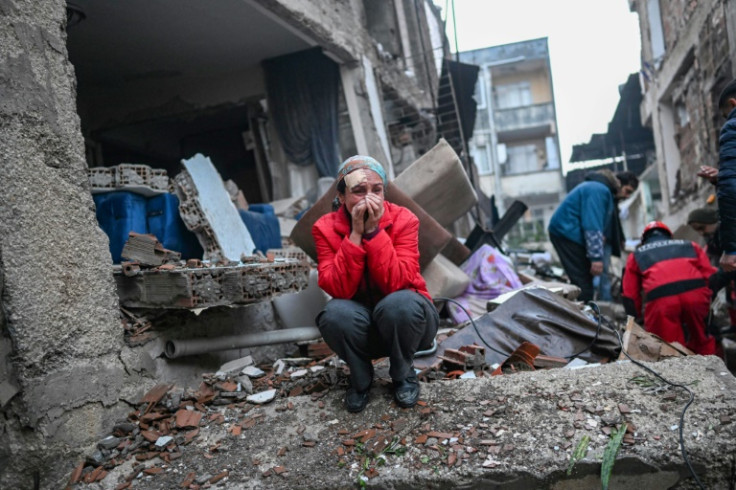Millions Of Vulnerable Refugees In Turkey-Syria Quake Zone

The devastating earthquake around the Turkish-Syrian border struck an area that is home to millions of refugees already battling desperate circumstances.
The United Nations said Tuesday that it was trying to reach refugees affected by the 7.8-magnitude quake, though its existing aid programmes are woefully underfunded.
"We do not know the exact number of refugees impacted and we might not for some days, but we fear the number might be significant, given the epicentre of the quake was close to areas with high concentrations of refugees," said Matthew Saltmarsh, spokesman for the UN refugee agency, UNHCR.
Some of the areas are hard to reach, slowing a "comprehensive assessment on loss of lives and damages", he told reporters in Geneva.
Turkey hosts more than 3.5 million Syrian refugees who have fled their country's civil war, almost half of them children.
In the 10 Turkish provinces affected by the quake, more than 1.7 million of the 15 million inhabitants are Syrian refugees.
Philippe Leclerc, UNHCR's representative in Turkey, said that in Kilis province, one in two people are Syrian refugees, while in Gaziantep, Sanliurfa and Hatay, the figure is one in four or five.
"These 10 regions are also hosting the largest refugee population in the world," he told Tuesday's briefing via video.
Meanwhile within Syria, more than 6.8 million people were internally displaced before the quake, and nearly 60,000 Palestinian refugees were in quake-affected northern Syria.
UNHCR said the quake was an "absolute hammer blow" for displaced Syrians who have already suffered more than a decade of war, an economic crisis and winter storms.
"The situation is tragic," Leclerc said.
Most Syrian refugees in Turkey are living among local populations, "in the same buildings which have collapsed. They are participating in the rescue as volunteers", he said.
Only 47,000 live in seven temporary accommodation camps in the 10 quake-hit provinces.
"These camps may be used as a place where earthquake victims will be transferred to," Leclerc said.
He said UN agencies were giving the Turkish authorities whatever aid they could, such as kitchen sets, mattresses and tents.
UNHCR may launch a separate earthquake appeal but assessments of need are still in the early stages -- and are being hampered by severe winter weather.
The agency has pre-existing appeals running for its refugee programmes in both countries this year, but they are desperately short of cash.
The Turkey appeal is for $348 million and is currently 11 percent funded by international donors, while the Syria appeal, for $465 million, is seven percent funded.
UNHCR has started distributing 30,000 core relief kits stockpiled in Syria -- 10,000 each in Aleppo, Homs and Tartus in the northwest. These contain mattresses, blankets, kitchen sets, plastic sheeting, jerry cans and sleeping mats.
It will also distribute winter clothing.
The agency also has 20,000 tents in stock in Damascus, and at least 19 large tent halls that can be used as reception areas or collective shelters. Moving them out of the capital will take around 24 hours.
There are 12 Palestinian refugee camps in Syria, housing around 438,000 people. Of these, three are in the quake-affected north: the Latakia camp, plus Neirab and Ein el Tal outside Aleppo.
"We are looking at 57,000 Palestine refugees who have been impacted because they live in the camps in the north," said Tamara Alrifai, spokeswoman for UNRWA, the UN agency for Palestinian refugees.
UNRWA urgently needs $2.7 million to cover the needs of affected refugees, Alrifai said.
She added that UNRWA had confirmed reports of six Palestinian refugees killed: a family -- mother, father, son and daughter -- in the Latakia camp, and two schoolgirls in Neirab.
"We can expect the numbers of fatalities to continue increasing," she said, with medical supplies, mattresses, blankets and hygiene items urgently needed.
UNRWA chief Philippe Lazzarini, who visited the Aleppo camps a fortnight ago, said on Twitter that "This earthquake adds an unbelievable layer of misery".
© Copyright AFP 2024. All rights reserved.





















